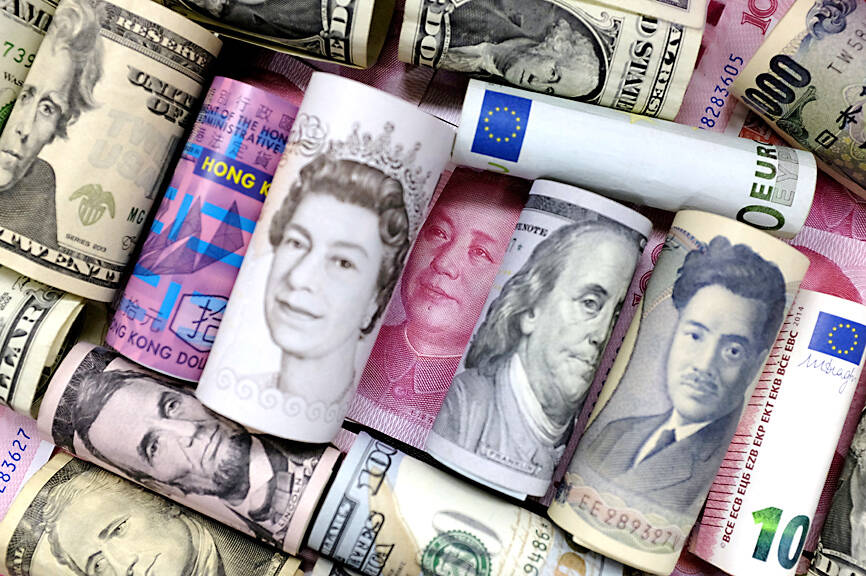Taiwan’s foreign exchange reserves last month gained US$1.13 billion from the previous month to US$577.98 billion, backed by higher interest income, which offset capital outflows, the central bank said yesterday.
November is the high season for the central bank to collect interest income on its bond holdings, Department of Foreign Exchange Deputy Director-General Ho Lan-chih (賀蘭芝) told a media briefing in Taipei.
“The currency market is quite stable and the central bank rarely stepped in to maintain market order and stability,” Ho said.

Photo: REUTERS
However, foreign portfolio managers trimmed their positions in local equities and bonds amid anxiety over US president-elect Donald Trump’s tariff threat, which could weigh on Taiwan’s electronics exports, she said.
The global capital movements also had to do with Trump’s pledge to “make America great again” through tax cuts and protectionist trade measures, which lent support to the US dollar against almost all other major currencies, Ho said.
Last month, the euro fell 2.27 percent, the British pound declined 2.28 percent, the Chinese yuan shrank 1.37 percent and the New Taiwan dollar depreciated 1.51 percent against the US dollar, she said, adding that the yen managed to buck the trend with a 2.14 percent increase.
Financial markets are now looking at a potential interest rate cut by the US Federal Reserve later this month after the latest data showed the US economy was relatively resilient, but appeared to be wanting in strength, Ho said.
The US dollar index, which measures the greenback against a basket of major currencies, picked up 1.69 percent last month, Ho said.
The movement of the greenback would continue to dominate the NT dollar’s direction even though the brief martial law declaration in South Korea helped boost the local currency this week, she said.
Taiwan last month replaced India as the world’s fourth-largest holder of foreign exchange reserves after China, Japan and Switzerland, central bank data showed.

Taiwan Semiconductor Manufacturing Co (TSMC, 台積電) last week recorded an increase in the number of shareholders to the highest in almost eight months, despite its share price falling 3.38 percent from the previous week, Taiwan Stock Exchange data released on Saturday showed. As of Friday, TSMC had 1.88 million shareholders, the most since the week of April 25 and an increase of 31,870 from the previous week, the data showed. The number of shareholders jumped despite a drop of NT$50 (US$1.59), or 3.38 percent, in TSMC’s share price from a week earlier to NT$1,430, as investors took profits from their earlier gains

In a high-security Shenzhen laboratory, Chinese scientists have built what Washington has spent years trying to prevent: a prototype of a machine capable of producing the cutting-edge semiconductor chips that power artificial intelligence (AI), smartphones and weapons central to Western military dominance, Reuters has learned. Completed early this year and undergoing testing, the prototype fills nearly an entire factory floor. It was built by a team of former engineers from Dutch semiconductor giant ASML who reverse-engineered the company’s extreme ultraviolet lithography (EUV) machines, according to two people with knowledge of the project. EUV machines sit at the heart of a technological Cold

Taiwan’s long-term economic competitiveness will hinge not only on national champions like Taiwan Semiconductor Manufacturing Co. (TSMC, 台積電) but also on the widespread adoption of artificial intelligence (AI) and other emerging technologies, a US-based scholar has said. At a lecture in Taipei on Tuesday, Jeffrey Ding, assistant professor of political science at the George Washington University and author of "Technology and the Rise of Great Powers," argued that historical experience shows that general-purpose technologies (GPTs) — such as electricity, computers and now AI — shape long-term economic advantages through their diffusion across the broader economy. "What really matters is not who pioneers

TAIWAN VALUE CHAIN: Foxtron is to fully own Luxgen following the transaction and it plans to launch a new electric model, the Foxtron Bria, in Taiwan next year Yulon Motor Co (裕隆汽車) yesterday said that its board of directors approved the disposal of its electric vehicle (EV) unit, Luxgen Motor Co (納智捷汽車), to Foxtron Vehicle Technologies Co (鴻華先進) for NT$787.6 million (US$24.98 million). Foxtron, a half-half joint venture between Yulon affiliate Hua-Chuang Automobile Information Technical Center Co (華創車電) and Hon Hai Precision Industry Co (鴻海精密), expects to wrap up the deal in the first quarter of next year. Foxtron would fully own Luxgen following the transaction, including five car distributing companies, outlets and all employees. The deal is subject to the approval of the Fair Trade Commission, Foxtron said. “Foxtron will be